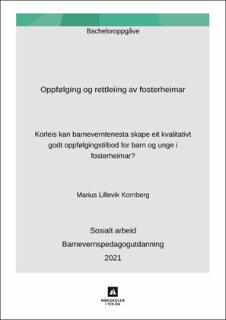Oppfølging og rettleiing av fosterheimar. Korleis kan barneverntenesta skape eit kvalitativt godt oppfølgingstilbod for barn og unge i fosterheimar?
Bachelor thesis
Permanent lenke
https://hdl.handle.net/11250/2763349Utgivelsesdato
2021Metadata
Vis full innførselSamlinger
Sammendrag
Den 1. januar 2022 trer den nye barnevernsreforma i kraft. Reforma medfører store endringar på fosterheimsområdet, der ansvaret for oppfølging- og rettleiing av dei ordinære fosterheimane overførast til den kommunale barneverntenesta. Ved hjelp av fokus intervju med yrkesutøvarar frå feltet, empowerment som teoretisk perspektiv og supplerande forsking på tematikken søker oppgåva å skape ny kunnskap, samt belyse korleis barneverntenesta kan styrke eigen praksis og skape kvalitet i utføringa av det nye arbeidet.
Problemstillinga som oppgåva søker å svare er dermed; korleis kan barneverntenesta skape eit kvalitativt godt oppfølgingstilbod for barn og unge i fosterheimar. For å svare på problemstillinga er det nytta kvalitative forskingsmetodar sentrert i organisasjonsforsking. Som datagenereringsmetode er det nytta djupneintervju med tre informantar. I analysen er funna konkretisert til empiriske konklusjonar, før empirien blir bygd vidare på ved induktiv metode i diskusjonen.
Av funna synar det seg ei overordna gjennomgåande usikkerheit knytt til tema som gjennomføring av omstruktureringa, behovet i dei ulike kommunane, økonomiske ressursar samt kunnskap, kompetanse og personalressursar. Usikkerheita viser seg som sentral i at den er delt av alle informantane. Gjennom sine refleksjonar utrykker alle intervjuobjekta at den faglege og metodiske kompetansen må vere på plass i utføring av eit slikt krevjande ansvarsområde.
I tråd med empowerment-tenkinga kan ein forstå dei tilsette i ein tilstand av unpowerment. For å motverke umyndiggjering og tiltaksløyse kan eit styrka fokus på tilsettestøttande tiltak bli viktig for tenestene. Eg hevdar difor at tenestene med god hensikt kan nytte modellar for empowerment og myndiggjering i planlegging og utføring av nye arbeidsoppgåver, og med dette leggje til rette for både kvalitet i overgangsfasa og i det vidare arbeidet. Som diskusjonen synar er reell empowerment eit krevjande mål å nå, og prosessen vil såleis krevje aktiv involvering av både organisasjonen, og dei tilsette. Abstract
On January the 1st, 2022, the new child welfare reform in Norway will enter into force. The reform involves changes in the areas concerning foster homes, where the responsibility for follow-up and guidance of the foster homes is transferred to the municipal child welfare service. By conducting focus interviews with professionals from the field, using empowerment as a theoretical perspective, and additional research on the topic, this thesis seeks to generate new knowledge on the topic. Further, it sheds light on how child welfare services can strengthen their practices and create quality in the execution of the reform.
This thesis's research question is how the child welfare service can create a qualitatively good follow-up service for children and young people in foster homes. To answer this research question, one uses qualitative research methods centred in organizational research. As a data generation method, in-depth interviews with three informants is conducted. In the analysis, the findings are concretized into empirical conclusions before the empirics are further built on by the inductive method in the discussion.
From the findings in the thesis, there appears to be an overall uncertainty related to the implementation of the restructuring of the services, the need in the various municipalities, financial resources, and knowledge, competence, and personnel resources. The uncertainty proves to be central as all the informants share it. Through their reflections, all the informants express that professional and methodological competence must be in place to execute such a demanding area of responsibility.
In line with empowerment thinking, one can understand the employees in a state of unpowerment. To counteract disqualification, a stronger focus on employee support can be necessary for the quality of the services. Therefore, the thesis claims that the services can, with good intentions, use models for empowerment in the planning and execution of new work tasks, thereby facilitating both qualities in the transitional phase and further work. As the discussion shows, real empowerment is a demanding goal to achieve, and the process will thus require the active involvement of both the organization and its employees.
